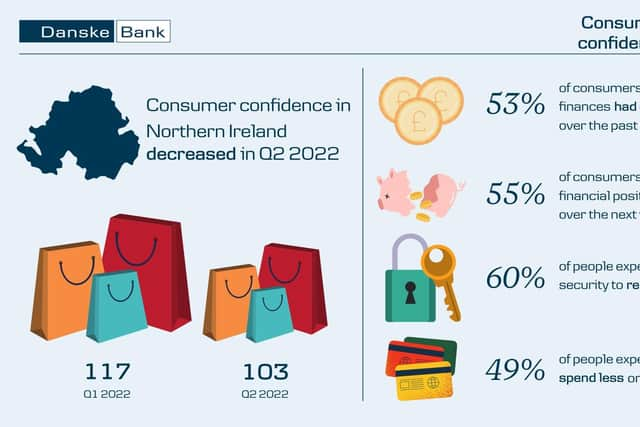‘Consumer spending in Northern Ireland will become increasingly squeezed’
and live on Freeview channel 276
Consumer confidence in Northern Ireland declined sharply in the second quarter of this year as higher prices weighed heavily on household finances, according to new analysis from Danske Bank.
The Danske Bank Northern Ireland Consumer Confidence Index decreased to a reading of 103 in the second quarter of 2022, down from 117 in the first quarter of the year, and significantly below the reading of 149 posted in the second quarter of 2021.
Advertisement
Hide AdAdvertisement
Hide AdCompared with the previous quarter, respondents to the June survey reported feeling less confident about their current finances, future finances, job security and expected spending on expensive items.


When asked what factor had the largest negative impact on their confidence levels, 47% of respondents pointed to the impact of higher prices on their household finances, 13% said that global risks, which includes the war in Ukraine, was as a contributing factor and for 12% of respondents the post-Brexit trading arrangements in Northern Ireland had an adverse impact on sentiment.
For 40% of consumers, society’s adjustment to living with Covid-19 had the largest positive impact on confidence, with 20% of respondents unsure as to what was making them feel more positive and 15% of people saying the overall performance of the local economy made them feel more confident.
With regards to their current finances, 20% of people felt their financial position had improved over the previous twelve months, but 53% believed their finances had deteriorated.
Advertisement
Hide AdAdvertisement
Hide AdAsked about their future finances, 19% of people expected their financial position to improve over the next year, however 55% thought their finances would worsen.


In terms of spending, 22% of consumers expected to spend more on expensive items over the next year, compared with 49% that expected to spend less.
Regarding job security, 13% of people expected to become more secure in their job and 60% of respondents felt their job security would remain unchanged however 9% expected their job security to worsen.
Commenting on the latest release of the index, Danske Bank chief economist Conor Lambe said: “In June, the month our survey was conducted, the rate of inflation in the UK hit a multi-decade high of 9.4% as a combination of factors including higher fuel and energy prices and global supply chain disruption continued to put upward pressure on prices.
Advertisement
Hide AdAdvertisement
Hide Ad“This high inflation was the largest driver of the fall in consumer confidence and, looking forward, it’s likely that consumer price inflation will rise even higher with price pressures further up the supply chain also at elevated levels.
“Given the higher prices currently being experienced and the expectation that inflation could move even higher, it’s likely that consumer spending in Northern Ireland and the wider UK will become increasingly squeezed. As such, the performance of the overall economy is expected to soften as we move through the remainder of 2022 and into 2023.”